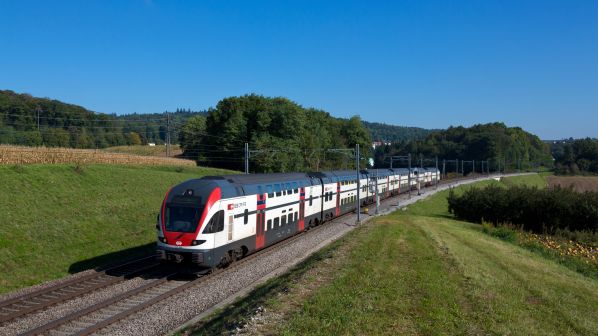SWISS Federal Railways (SBB) has presented its Strategy 2030, which outlines the company’s plans and shows how the railway intends to recover from the Covid-19 crisis.
The plan focuses on ensuring existing services are punctual, reliable and safe, while also positioning the company to be more flexible and efficient, and growing in a targeted and smart manner. The focus until 2025 will be on improving the rail network’s robustness and financial stability.
SBB says it is in a challenging phase, with passenger numbers expected to continue increasing, while at the same time demand for more flexible options is growing as travel behaviour becomes less predictable. This has been accentuated by the Covid-19 pandemic, which has changed work habits while also putting pressure on finances.
“The SBB 2030 strategy builds on the strengths of our railways, which are the envy of many countries,” SBB chairwoman, Ms Monika Ribar, told a press conference in Bern on November 25. “On the other hand, we want to be economically stable and anticipate customer needs much better by 2030 than we do today - for Switzerland and as a public service company.”
“First of all, we have to ensure robustness in the railway system and sustainable financing of SBB,” says SBB CEO, Mr Vincent Ducrot. “By 2030, we want to gradually make our services more flexible; the basis remains the tried and tested regular interval timetable. In this way, we will make rail more attractive compared to motorised private transport.”
SBB plans to expand the flexibility and frequency of services, including adapting the timetable to suit passenger needs such as adjusting the timetable on weekends for leisure passengers or adding seasonal trains.
SBB says this will require robust infrastructure and a high quality of service, with the railway now focusing on planning and improving its operations to achieve this.
Rail travel should become easier, more comfortable and more attractive with better customer information provided during disruptions, barrier-free access, and new or modernised trains that take into consideration changing passenger needs such as the requirement to carry bicycles. SBB also wants to improve access to different transport modes from its stations, and when booking journeys online.
The railway is planning to focus growth on its core business, including increasing the speed of long-distance passenger and freight services, and within cities. SBB is also improving international connections to become more competitive with air and road travel, with services such as the night train from Zürich to Amsterdam developed in partnership with Austrian Federal Railways (ÖBB) and German Rail (DB). It also plans to work with the public transport sector to simplify ticket prices and product ranges and ensure its stations are attractive transport hubs linking public and private transport.
SBB also plans to digitise its core business, improve vehicle maintenance and invest in maintenance facilities. To enhance its financial situation, the company will reduce costs by 2025, increase productivity and improve efficiency, and will also develop real estate to provide long-term income. SBB plans to be climate-neutral by 2030 and plans to reduce its overall energy consumption.

